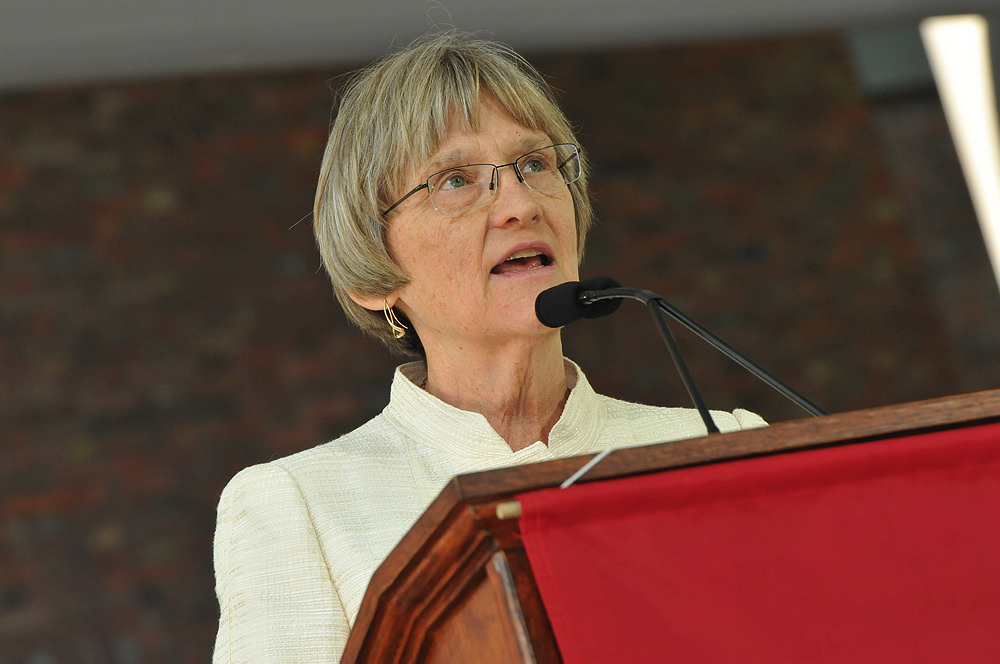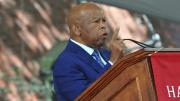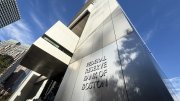Before the two main speeches of the afternoon exercises—officially the annual meeting of the Harvard Alumni Association (HAA)—HAA president Susan Morris Novick ’85 told the newly minted members in the class of 2018: “It is my pleasure to welcome you home for eternitas.”
Novick introduced the HAA president-elect, Margaret Wang ’09, the University’s president-elect Lawrence S. Bacow, and the new members of the HAA’s board of directors and Harvard’s Board of Overseers.
Harvard president Drew Faust presented three Harvard Medals, for extraordinary service to the University, to:
- Robert Coles ’50, a child psychologist and former Agee professor of social ethics at the Graduate School of Education, best known for his series Children of Crisis, published in five volumes across the span of a decade;
- Robert N. Shapiro ’72, J.D. ’78, CEO at Ropes Wealth Advisor, for his contributions as an “alumni leader, stalwart volunteer, and trusted advisor”; and
- Alice “Acey” Welch ’53, for her advocacy work as leader of the Committee for the Equality of Women at Harvard and the Alumnae-i Network for Harvard Women.
Novick then presented a special Harvard Medal to Faust: “You have authored a remarkable chapter in Harvard’s story, leading the University forward with wisdom, courage, and integrity.” Faust made a good show of looking surprised; after about a minute of prolonged applause, she made a little gesture to insist the audience sit down.
“The House of Harvard”
Congressman John Lewis is, by now, a familiar figure at Harvard. He came to the Yard in 2012 to receive an honorary Doctorate of Laws, and again in 2016 to unveil a plaque on Wadsworth House honoring slaves owned by eighteenth-century Harvard presidents. This afternoon, he returned to the Tercentenary Theatre to deliver the centerpiece address for the 367th Commencement.
He began his remarks with a tribute to Faust. “I want to take just a moment to honor the tenure of a great leader.” He continued, “Madam President, thank you for being a friend. But more importantly, thank you for using your office to move Harvard toward being a more all-inclusive institution.” He singled out efforts to bring disciplines and schools together as “One Harvard”: “Along the way, you realized that the brilliant mind is not confined to one discipline or one way of thinking. In fact, true genius seeks connections and relationships across barriers to build a new understanding of the world around us.”
He then turned to the new graduates to tell them, “You must lead. You’re never too young to lead, you’re never too old to lead. We need your leadership now more than ever before.” Lewis continued, “We must save our country. We must save it. We must save our democracy. There are forces in America today, and around the world, that are trying to take us to some other place. Our foremothers and our forefathers brought us to this place. Maybe our foremothers and our forefathers all came to this land in different ships. But as the late A. Phillip Randolph said, on more than one occasion, ‘We are all in the same boat now.’ We must look after each other, and care for each other.” (Lewis used this same quote in his address to the new graduates of Boston University earlier this week; then, too, it drew cheers.)
Lewis reminded the audience that they could not afford to sideline themselves, or to squander the legacy of those who had put their bodies and lives on the line to expand the franchise. “The vote is precious. It’s almost sacred. It is the most powerful nonviolent instrument or tool we have in our democratic society, and we must use it. If we fail to use it, we will lose it.” He continued, “So during this election year, I urge you, I plead with you, to do what you can to save and rescue America. To do what you can do save the planet. Save this little spaceship we call Earth and leave it a little cleaner, a little greener, and a little more peaceful, for a generation yet unborn.”
His advice on civic participation and leadership included this tidbit:
And guys, I say to you, if you're not mindful, the women are going to lead us. [Cheers from the audience.] It is my belief, it is my feeling as I travel around America, that the women and young people—high-school students, elementary school students, and college students—will lead us as part of a nonviolent revolution and we will create an America that is better, a little more humane. And no one, but no one, can deny us that.
The congressman went on to share a story of a man who had beaten him bloody in South Carolina during a Freedom Ride in May 1961, and years later came to Lewis’s office in Washington and asked for his forgiveness. They embraced, Lewis said, adding: “It is the power of the way of peace. It is the power of love. It is the power of the philosophy and the discipline of non-violence. We need to create a society where we can be reconciled, and lay down the burden of hate. For hate is too heavy a burden to bear.”
Lewis then touched on the grief-filled spring 50 years ago, when Martin Luther King Jr. was assassinated. (King had been invited to address Harvard’s Class Day; his widow, Coretta Scott King, spoke instead.) “Two months later, Bobby Kennedy was gone, and I cried some more,” said Lewis. Quickly, though, he addressed the present. “Today we’ve got to get rid of our tears, and not be down, and not be lost in a sea of despair. We’ve got to be hopeful and keep the faith, and turn the ship of state around. We can do it, and we must do it.”
As he had at Boston University—almost to the letter—he told the audience, “In the ’60s, I was arrested a few times—40 times. And since I’ve been in Congress, another five times. And I’m probably going to get arrested again.” (These lines got laughs and applause at Harvard, too.) “My philosophy is very simple: when you see something that is not right, not fair, not just, stand up! Say something. Speak up, and speak out!”
He closed with a story from his boyhood in rural Alabama, about a day when he and his cousins were playing outside an aunt’s shotgun house. “I know here at Harvard, you’ve never seen a shotgun house,” he added. “You don’t even know what I’m talking about.” There was only one way in, and one way out; it had a dirt yard.That day, during a harsh thunderstorm, his aunt called him and the other children in. They cried as the rain beat down. At times, the wind seemed to lift a corner of the house, and his aunt sent them to that corner to hold it down with their bodies:
When another corner appeared to be lifted, she had us walk to that corner. We were little children, walking with the wind. But we never, ever, left the house. So I say to you, each and every one of us, the wind may blow, the thunder may roll, the lightening may flash, and the rain may beat down on our house.
Call it the house of Harvard. Call it the house of Cambridge. Call it the house of Boston. Call it the house of Washington, or Alabama, or Georgia. We all live in the same house. We all must hold our little trembling house down. So I say to you, walk with the wind, and let the spirit of history be your guide.
“Farewell Words” from Faust
President Drew Faust then gave what she termed a “valedictory”: “literally, ‘farewell words.’”
Eleven years ago, Faust said, she had described inaugural addresses as “‘expressions of hope un-chastened by the rod of experience.’ By now, I should know that rod.” What followed was a small sampling of events that had transpired over her tenure: the launch of the iPhone, the financial crisis, the Boston Marathon bombings, and “a cheating crisis, an email crisis, a primate crisis, and sexual assault and sexual harassment crises.”

Drew Faust
Photograph by Jim Harrison
This spring, speaking to graduating seniors, Faust said they’d seemed uncertain of the world they were about to enter. “They spoke of the ways they had changed and grown, but, more pointedly, they spoke of how the world seemed to have changed around them. They worried about the health and sustainability of the earth; they worried about the health of our democracy and of civil society. And they described how their attitudes and plans had altered because of these changed circumstances. They no longer took their world for granted; the future of our society, our country, our planet could not be guaranteed; it was up to them. Their careers and life goals had shifted to embrace a much broader sense of responsibility extending beyond themselves to encompass an obligation to a common good they had come to recognize might not survive without them.”
But, she said, she wanted to affirm her core belief that institutions of learning are “beacons of hope”—and that her time leading Harvard had made her hopeful:
The privilege of interacting with Harvard’s remarkable students and faculty, and the dedicated staff who support their work, has uplifted me every day for the past eleven years. It would be next to impossible not to believe in the future they are so intent to build. But there is another way that Harvard fills me with hope, and that is the way we as a community—living and working together within these walls—are endeavoring ourselves to grapple with the challenging forces dividing and threatening the world—forces like climate change, or the divisiveness that poisons our society and polity, the undermining of facts and rational discourse, the chilling of free speech.
For many, Faust said, Harvard is the most diverse place they have ever come to. Students meet peers with different backgrounds and beliefs, and have to learn from these differences—an “experiment” which “has its challenges,” she said. A later line drew applause: “We must be a place where facts matter, where reasoned and respectful discourse and debate serve as arbiters of truth.”
Hope requires work, she continued: “As I step down from my responsibilities as Harvard president, I am keenly aware of another of hope’s fundamental attributes. It implies work still unfinished, aspirations not yet matched by achievement, possibilities yet to be seized and realized. Hope is a challenge.”
Faust grew quiet, and seemed emotional, as she delivered these favorite words of hers, one last time: “May Harvard be as wise as it is smart, as restless as it is proud, as bold as it is thoughtful, as new as it is old, as good as it is great.”








